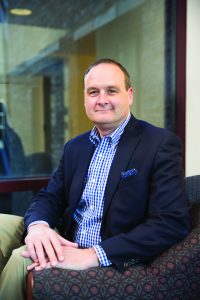It’s not surprising that when people are in the hospital, they’re focused not only on being cared for in a service sense—they want to feel cared for in every sense. “Patients don’t separate ‘care and cure.’ They see the experience as a holistic one,” says Assistant Professor of Marketing Andrew Gallan.
It’s the factors that impart those feelings of satisfaction that spark Gallan’s curiosity; his research focuses on service design and the customer experience, particularly in health care.
“When I go into an organization to provide advisory services, I tell staff, ‘I’m here to bring the patient’s voice into the organization and get as close as I can to the truth of the patient’s experience.’”
Providers have good reason to listen. Today’s medical community has an avid interest in metrics, with the biggest drivers revolving around an assessment of care, Gallan explains. The federal government requires any hospital that accepts Medicare to deploy an important series of patient surveys that ask about everything from the admissions process to noise at night. For patients, however, the issue boils down to a singular concept: communication. “At the end of the day, patients want to feel that they have the tools, knowledge and ability to go home and care for themselves,” Gallan asserts.
He should know. An active researcher, Gallan spends much of his time in patient settings, shadowing patients and conducting ride-alongs with home health nurses. For the last couple of years, he has worked as an advisor to the family practice and home health groups of Advocate Health Care, a large Downers Grove, Ill.-based health system with more than 250 sites of care and one of the largest home health companies in the state.
Gallan brings everything he learns back to the classroom. In fact, he was the first professor in the country to develop a graduate-level course on patient experience. “I think very carefully about how to lay out the curriculum in my courses to achieve buy-in and equip students with the knowledge they need to succeed in a career in this field.” For example, Gallan offers a health care data analytics class, an area he believes is very important for MBA students, and gives students numerous opportunities to obtain hands-on experience.
“My students work with me on research projects at Rush University Medical Center and other places, where I arrange for them to be mentored by professionals in the patient experience area,” Gallan says. “They’re involved with virtually everything I do.”

